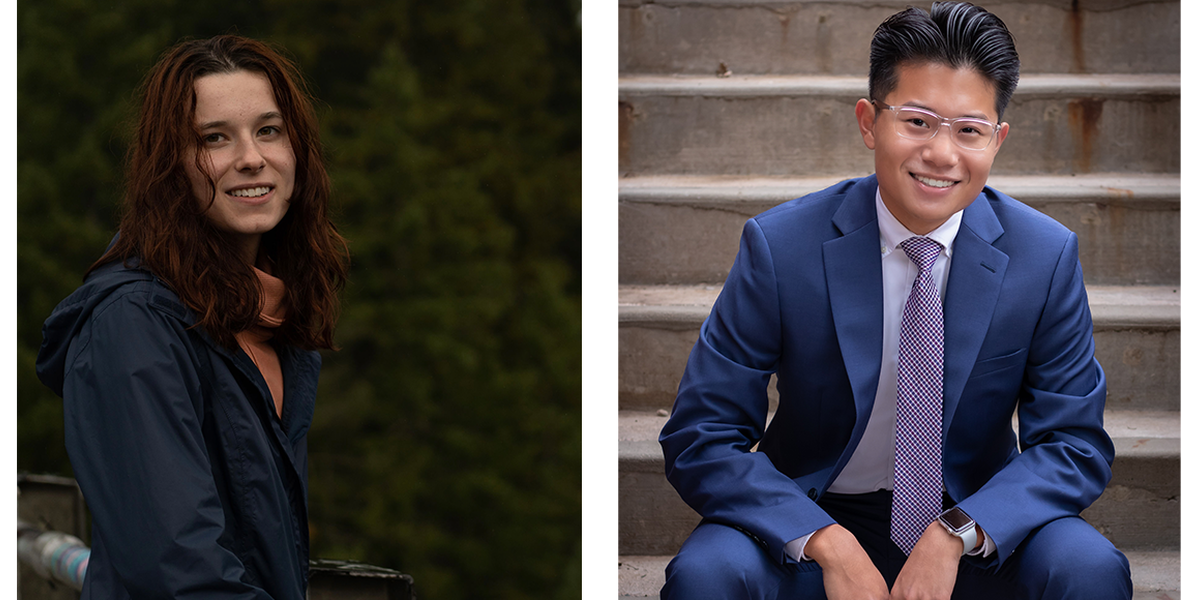
Two students in the College of Biological Sciences at the University of Minnesota, Twin Cities are among 68 students nationally who have been awarded scholarships for the 2023-24 academic year by the Astronaut Scholarship Foundation. The prestigious Astronaut Scholarship is awarded annually to outstanding sophomores and juniors who intend to pursue research-oriented careers in mathematics, engineering, and the natural and applied sciences. Scholars exhibit the intelligence, vision, drive, and skills necessary to carry out innovative research.
Madelyn Blake, who is majoring in Neuroscience and Genetics, Cell Biology & Development, has been recognized for a second year after first receiving the award as a sophomore. Since arriving on campus as a PSEO student in high school, she has engaged in research and coursework preparing her for a career in medical research. She is particularly interested in the neurobiology of addiction and has been working with Benjamin Saunders of the Department of Neuroscience on a study of striatal dopamine signaling, but she has also completed a biostatistical assessment of mortality disparities in Minnesota due to the COVID pandemic with Clifford Steer of the Medical School and is engaged in a study of right ventricular disfunction with Kurt Prins of the Lillehei Heart Institute. Madelyn is also the founder of Brains for Change, a nonprofit that provides a neuroscience-based addiction curriculum for high schools, and she is a STEM tutor in the Lindahl Center and a teaching assistant for courses in Neuroscience, Biochemistry and Cell Biology. She plans to complete an MD/PhD program and work as a researcher for the NIH, directing neuroscience research and creating public policy on addiction.
Roj Cosiquien, a Genetics, Cell Biology & Development major, learned the basic techniques of modern genetic research as a freshman studying neurodegenerative disease with Thomas Hays in the Department of Genetics, Cell Biology & Development. As a result, he has become interested in both the potential of genetic research to create new therapeutic tools and the social implications of genetic technology. With Ian MacFarlane of the Genetic Counseling Program, he has conducted research on perfectionism among genetic counselors and the experience of BIPOC counselors. At the same time, he has been investigating the effects of spinal fusion surgery on lumbosacral hypolordotic patients with Jonathan Sembrano of the Medical School. Roj, who has also served as a student representative to the Board of Regents, plans to complete an MD/PhD to expand his ability to create new therapies that will make healthcare broadly accessible to global populations.
About the scholarship and foundation:
The Astronaut Scholarship Foundation was founded in 1985 by the Mercury 7 astronauts, one of whom, Donald “Deke” Slayton, graduated from the University of Minnesota with a B.S. in Aeronautical Engineering in 1949. Prevented from piloting the second U.S. manned orbital space flight by an irregular heart rhythm, Slayton served as NASA’s Director of Flight Crew Operations and later was cleared to pilot the docking module in the Apollo-Soyuz mission of 1975. The Astronaut Scholarships are awarded to students at 44 universities with historic ties to the U.S. space program who demonstrate leadership, imagination, and academic excellence in the study of mathematics, science or engineering. The scholars receive up to $15,000 for a year of undergraduate study. In addition, recipients receive mentoring and professional development support, attend the Astronaut Foundation’s Innovators Gala in Orlando, Florida, and have the opportunity to participate in other Astronaut Foundation events.